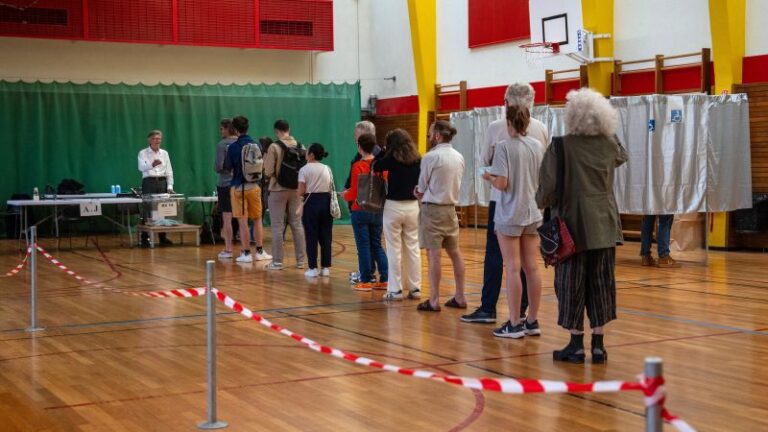Cheering broke out in the streets of Paris late on Sunday after the left-wing New Popular Front (NFP) was projected to win against the far-right National Rally (RN) in France’s early parliamentary elections.
Huge crowds later gathered in the capital’s Republic Square to celebrate their left-wing coalition winning the most seats in parliament, chanting “Young people destroy the National Front”, a popular left-wing slogan.

The NFP is a grouping of several political parties, ranging from the far-left Indomitable France party to the more moderate Socialist and Environmental parties.
According to the French Interior Ministry, the coalition won 182 seats in the National Assembly, making it the largest group, but falling short of the 289 seats needed for an absolute majority.

Jean-Luc Mélenchon, the firebrand leader of the Unbowed France party, told a crowd of enthusiastic supporters near Stalingrad Square that the result came as “a great relief for the vast majority of our country.”
“The people have clearly rejected the worst-case scenario,” said Mélenchon. “A great wave of national mobilization has begun!”

Late on Sunday, police fired tear gas into a crowd of mostly young people and cleared Republic Square.
But protesters have remained positive, with pictures showing people cheering and celebrating across the city.

The mood was even more oppressive for supporters of the far-right RN party.
The excited atmosphere at the RN election event in Paris’ Bois de Vincennes took a nosedive an hour before polls closed when it became clear that the far-right party would come third in the polls.

After the forecast was released, Jordan Bardella, the 28-year-old leader of the French Revolutionary Party, said France had fallen into “uncertainty and instability.”
Despite leading in the first round of voting, Marine Le Pen’s far-right National Rally (RN) party and its allies won 143 seats.
With no party capable of winning a majority, parliament is likely to split into three factions and become dysfunctional.

The RN’s strong performance in the first round of voting raised concerns that France was on the verge of electing its first far-right government since the Vichy regime during World War II.
But Sunday’s result was a major upset and demonstrated French voters’ overwhelming desire to prevent the far right from seizing power, even if it means a hanging parliament.

After slumping to a dismal third place in last Sunday’s first round of voting, President Emmanuel Macron’s centrist Ensemble coalition bounced back strongly to win 163 seats.
Macron’s successor, Gabriel Attal, announced he was stepping down as prime minister on Monday morning. He criticized Macron’s decision to hold an early vote and said he “did not choose” to dissolve the French parliament.

The French president appoints a prime minister from the party that wins the most seats after parliamentary elections. Typically, that means a candidate from the president’s own party. But Sunday’s results mean Macron faces the possibility that he may have to appoint someone from a left-wing coalition in an unusual arrangement known as “coexistence.”
Speaking to supporters near Stalingrad Square, Melenchon said Macron had an “obligation to hand over power to the New Popular Front”.

